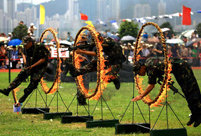 Vintage cars show kicks off in London
Vintage cars show kicks off in London
 Gorgeous scenery in NE China
Gorgeous scenery in NE China
 Picturesque Barkol grassland in Xinjiang
Picturesque Barkol grassland in Xinjiang
 Small Wild Goose Pagoda - A World Cultural Heritage Site along the Silk Road
Small Wild Goose Pagoda - A World Cultural Heritage Site along the Silk Road
 Maritime Silk Road Luxuries of the Han Dynasty
Maritime Silk Road Luxuries of the Han Dynasty
 Ciao! Chinese beauties!
Ciao! Chinese beauties!
 An eye feast: BFA freshmen registration
An eye feast: BFA freshmen registration
 Top 10 most lavish weddings
Top 10 most lavish weddings
 Most amazing chi-pao beauties
Most amazing chi-pao beauties
 Chinese lingerie brand arrives in Las Vegas
Chinese lingerie brand arrives in Las Vegas
The World Health Organization (WHO) on Tuesday called on Beijing legislators to fix the loopholes in the city's upcoming indoor smoking ban legislation.
The Beijing Municipal People's Congress will on Thursday go through the second reading of a draft law that would ban smoking in all indoor public places, a step toward meeting its commitment to cut down on indoor tobacco use in a convention ratified with the WHO in 2005.
The WHO, however, expressed worries that a major loophole in the draft law which would allow smoking in "single occupancy" work places might weaken the law and create imbalance in its enforcement.
As the draft is currently written, smoking would still be permitted in offices occupied by a single person, usually leaders and senior staff.
"Exceptions to the new law that provide special privileges for senior managers and officials would foster a perception that China has one rule for its elites, and another for its workers," Bernhard Schwartlander, WHO representative in China, wrote in a letter sent to the media as part of their government lobbying campaign.
Schwartlander urged Beijing to "set a precedent" in its anti-smoking ban, saying that only a comprehensive ban will comply with the terms of WHO's Framework Convention on Tobacco Control, which China signed in 2005.
The convention obligates China to adopt laws that protect citizens from exposure to tobacco smoke in offices and other indoor public places.
"We have reached out to the Beijing People's Congress on this matter … and we are optimistic that the Beijing lawmakers would listen to our concerns," WHO Tobacco Free Initiative in China's Angela Pratt told the Global Times on Tuesday.
The draft would also allow hotels and airport waiting halls to build "smoking rooms with independent ventilation systems," although some expressed skepticism at the effectiveness of these rooms at preventing second-hand smoke.
 Military training in Hong Kong
Military training in Hong Kong Teahouses in Chongqing: Worship to the leisure lifestyle
Teahouses in Chongqing: Worship to the leisure lifestyle Giant white gourd weighing 87 kilograms appears in SE China
Giant white gourd weighing 87 kilograms appears in SE China Advanced arms help to safeguard China-ASEAN Expo
Advanced arms help to safeguard China-ASEAN Expo Leading director Wang Quan'an detained for 'buying sex'
Leading director Wang Quan'an detained for 'buying sex' Heaven on earth: Dongjiang Lake in Hunan
Heaven on earth: Dongjiang Lake in Hunan Mixed reaction to smartphone sidewalk
Mixed reaction to smartphone sidewalk Amazing aerial photos of China's Xisha Islands
Amazing aerial photos of China's Xisha Islands Top 10 world's highest-paid models 2014
Top 10 world's highest-paid models 2014 Lingerie show at 2014 Miss China
Lingerie show at 2014 Miss China Songstress Li Xianglan dies at 94
Songstress Li Xianglan dies at 94 Police recruiting posters
Police recruiting posters Anshun Daxi- Living fossil of Chinese drama
Anshun Daxi- Living fossil of Chinese drama Urban farmers in China
Urban farmers in China 'Firepower-2014 Weibei'military exercise
'Firepower-2014 Weibei'military exerciseDay|Week|Month